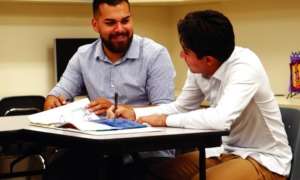Education Pays: The Benefits of Higher Education for Individuals and Society
College Board Advocacy and Policy Center
A new report from the College Board Policy and Advocacy Center finds that not only is there a wage gap between college graduates and everyone else, but there’s also a fat gap, a volunteering gap and a reading-to-your-children gap.
The report, Education Pays: The Benefits of Higher Education for Individuals and Society, focuses primarily on the financial benefits of a college degree, but also uses data on various lifestyle measures to make the case that a college degree has numerous private and public benefits.
Using government and academic sources, the report says that in 2008, people with a bachelor’s degree earned an average of $55,700, compared with $33,800 for those with only a high school diploma. And while unemployment rates have risen across the board in recent years, the gap between those with a bachelor’s degree and those with only a high school diploma expanded from 2.3 percentage points in 2005 to 5.1 percentage points in 2009.
Even among college graduates, salaries differ among racial groups. In 2008, Asian males with bachelor’s degrees out-earned all other groups. Other top earners were white males, followed by Asian females, Hispanic males and black males.
That is one of many ways that race and economic class affect college access and success. College enrollment rates have generally increased for most racial groups over the past two decades, the report says, with whites maintaining the highest rates and African-Americans seeing a slight drop recently. The result: In 2008, about 70 percent of white, 62 percent of Hispanic and 56 percent of black high school graduates enrolled in college within 12 months of high school graduation.
As for income, while 80 percent of 2008’s high school graduates from the highest income brackets went straight to college, the figure for the lowest income bracket (topping out at $19,000 a year) was 55 percent.
Outside of the workplace, the report says that college graduates are more likely than nongraduates to exercise and less likely be obese (with figures differing by age groups), less likely to smoke (9 percent vs. 27 percent), more likely to read to their children daily (68 percent vs. 41 percent) and more likely to engage in various civic activities, such as volunteering (43 percent vs. 19 percent).
The report does not contend that college degrees are the reason for all of the beneficial outcomes. Factors such as poverty, family situations and traditions (like parents voting) and neighborhood characteristics clearly affect many of the behaviors measured here. However, the board contends that “most of the differences in outcomes are, in fact, the result of individuals’ education,” because higher education brings “increased opportunities” and “changes the way people approach their lives.”
For another point of view, The Washington Post recently ran this story suggesting that for many people, a college education is not worth the cost in terms of the financial payback. Among the assertions: “If you crunch the numbers, some experts say, college is a bad investment.”
The 56-page report is available at http://trends.collegeboard.org/wp-content/uploads/sites/13/Education_Pays_2010.pdf.






























